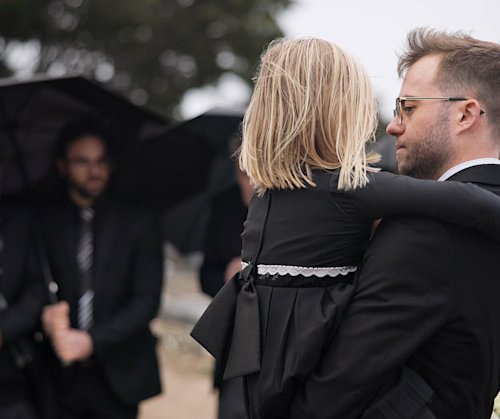There is no simple answer to the question: should children go to funerals? Families finding it difficult to decide can find reassurance in knowing that there is no right or wrong choice - you are free to do what feels best for you and your loved ones.
For adults and children alike, funerals can be an important part of the grieving process. Funerals are a time to say goodbye and can mark the beginning of accepting that a loved one is gone, but they can also be very upsetting.
Jamie Howard, Clinical Advisor at the Child Mind Institute says, “Funerals can help us to cry and say our goodbyes to someone we love. They give us a chance to remember, with others, the goodness and joy that person brought to our lives and help to begin to heal the hurt we feel.”
The alternative view is that children should be protected from the upset of a funeral. In a 2013 Guardian article, widow Rachel West didn't let her children, aged four and six, attend their father's funeral. She told the Guardian, “I was in absolute pieces that day, and needed to be. That alone would have caused them immeasurable distress.”
Strong emotions
It’s important to consider how the other people might react at a funeral. While it is important for children to understand that it is natural to feel upset and to comfort them with the knowledge that they will feel better eventually, it might be best to avoid exposing them to intense emotional displays.
If your child gets anxious or is easily distracted, then perhaps a funeral service will not be the best environment for them. If you are unsure how your children will be at the funeral, The Bereavement Advice Centre suggests making sure that there is a trusted adult there who is less emotionally impacted by the death. They will then be able to take the children out of the service if they become upset or restless.
Grown-up memories
When they are grown up, children who have attended a funeral may not remember all the details, but they will remember that it was a meaningful experience and that they were part of it.
Writing on the Marie Curie website, teenager Alea says that when she went to her Grandfather’s funeral at the age of eight, “there were just so many people – a hundred, maybe more. They filled up the whole church – it was amazing to be sitting there, knowing that the man who I loved so much had so many people gathering in his name.”
Preparing children for a funeral
If you do plan to take your children to a funeral, it is helpful to prepare them, which celebrant Alex Collis refers to as ‘demystifying the process.’ Try to describe what it will be like. There could be people wearing dark clothes. There will be a coffin at the front of the room and a celebrant leading the service.
Try to answer questions honestly. The Bereavement Centre recommends this guide for grown-ups when children ask questions about death.
If an older child has been given the option to attend and chooses to go, you may find that involving them in the planning process or allowing them a special role on the day helps. They may enjoy helping to pick out flowers or a design for an order of service. Remind them that it’s their choice about how involved they are and they can always change their mind and take a step back.







